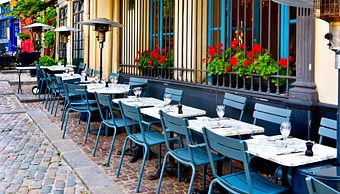the Restaurateur
Is Buying an Existing Restaurant Worth the Risk?
May 18, 2017Don’t be too hasty with buying an existing restaurant; you will want to meticulously research the restaurant’s location and existing reputation.
Thinking of purchasing a restaurant? If you’ve looked through the sale listings, you’ve probably found a good amount of restaurants on the market, which can make you feel overwhelmed with opportunity. However, keep in mind that the failure rate amongst restaurants is very high, so take time to find out why the previous owners are selling the restaurant you’re interested in purchasing.
6 Important Considerations
- Beware of Leases - If you’re new to the restaurant industry, leasing may provide a lower cost of entry. However, the lack of control of the property can raise other issues. Once you have invested significant resources to refresh the space and market the business, the property owner could unreasonably increase the rent or refuse to renew. If leasing is the only option, you will want a long term lease with defined renewal terms; experts do not recommend anything less than five years and renewals can be added to the original term with clearly outlined rent increases.
- Location - Location directly correlates with the lease in place, so make sure you are aware of the history behind the location, its proximity to office workers, malls, movie theaters, etc. Perhaps the owner is selling the business because of a competing restaurant nearby or changes in traffic patterns.
- Reputation - If the restaurant has a positive reputation, regular customers will expect the same service and quality they received with the previous owner(s). If the restaurant has a bad reputation, it will be very hard to recover, and customers will not necessarily know that the restaurant is under new ownership. Overcoming a negative image may require more resources than beginning from scratch. It will be important to be visibly different from the prior establishment so that potential customers will give it a try.
- Status of Equipment - Be sure to get the building and equipment inspected before you bind yourself to the purchase. The owner could be selling the property to dodge an expensive repair. If the equipment is not in working condition and has not been well maintained, you might be able to negotiate repair costs into the purchase price.
- Due Diligence - Have you conducted a due diligence review of the restaurant? If not, you probably should. Though it is a big undertaking to conduct the review, it is worthwhile. Make sure you allow yourself adequate time to conduct the review; there are about 125 things you need to investigate including sales tax records, payroll records, liquor license, employee work schedule, and much more. Why are they selling? An owner who wants to retire or relocate may be open to alternative arrangements – can you manage the business for a period of time with an option to buy? If so, this is an excellent opportunity to identify potential issues or a transition that provides the benefit of the existing owner’s experience and goodwill.
- Lack of flexibility - Remember that you are purchasing an existing restaurant, not starting your own, so before purchasing be aware that it might not be in your best interest to dramatically change the menu or décor of the restaurant, especially if the restaurant already has a strong customer base.
Buying a restaurant can be an exciting endeavor, and a profitable effort in the long run. The risks involved are hard to ignore, though, so be prepared for some disappointment in your decision process. Revamping an existing restaurant can allow you the flexibility of a startup without as much uncertainty as beginning from zero. You can also consider buying into a franchise to take advantage of their established status and brand recognition.
Questions? Contact any member of our Hospitality Services Group.



